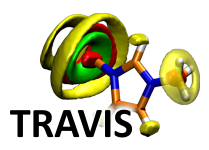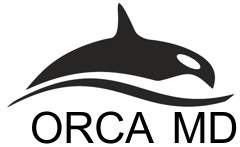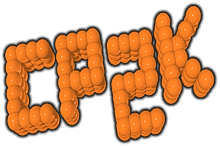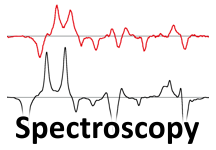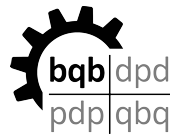Hellmann AwardI am happy to announce that the Hellmann prize (“Hellmann-Preis”) 2021 of the “Arbeitsgemeinschaft Theoretische Chemie” (AGTC) was awarded to me, and I would like to express my deep gratitude to the committee. |
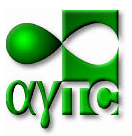
|
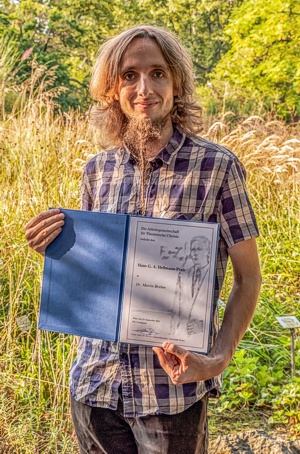
Please find below the original text and figure from the award certificate:
Dr. Martin Brehm
für die herausragenden Erfolge bei der Entwicklung und Anwendung spektroskopischer Vorhersagemethoden für komplexe Fluide.
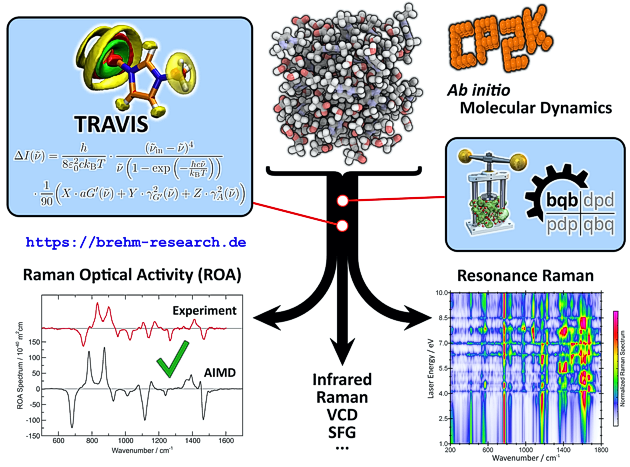
Martin Brehm hat mit seinen Entwicklungen spektroskopischer Vorhersagemethoden entscheidend zur Berechnung von Schwingungsspektren komplexer Fluide beigetragen. Die auf Grundlage von quantenchemischen MD-Simulationen berechneten Spektren erfassen den vollen Lösungsmittel- und Temperatureinfluss und erklären die wesentlichen anharmonischen Effekte in den experimentellen Linienformen, was so für Raman-Optical-Activity- und Resonanz-Raman-Spektren bisher kaum möglich war.
About the Award
In accordance with the guidelines, the Hellmann prize is awarded for excellent scientific achievements from the overall field of theoretical chemistry to junior scientists (typically not over 40 years), which do not have a lifetime professorship yet and which are associated with the German-speaking research landscape.
The price is awarded yearly since 1999 (except for 2009 and 2015):
| Year | Awardee |
|---|---|
| 2025 | Prof. Dr. Christoph Bannwarth |
| 2024 | Dr. Christian Schilling |
| 2023 | Prof. Dr. Carolin König |
| 2022 | Prof. Dr. Sergey Bokarev |
| 2021 | Prof. Dr. Martin Brehm |
| 2020 | Prof. Dr. Jeremy Richardson |
| 2019 | Prof. Dr. Thomas Jagau |
| 2018 | Prof. Dr. Bettina Keller |
| 2017 | Prof. Dr. Sandra Luber |
| 2016 | Prof. Dr. Ralf Tonner-Zech |
| 2015 | — |
| 2014 | Prof. Dr. Christoph Jacob |
| 2013 | Prof. Dr. Jörg Behler |
| 2012 | Prof. Dr. Johannes Kästner |
| 2011 | Prof. Dr. Daniel Sebastiani |
| 2010 | Prof. Dr. Andreas Köhn |
| 2009 | — |
| 2008 | Prof. Dr. Robert Berger |
| 2007 | Prof. Dr. Andreas Dreuw |
| 2006 | Prof. Dr. Michael Thoss |
| 2005 | Prof. Dr. Frank Neese |
| 2004 | Prof. Dr. Christof Hättig |
| 2003 | Prof. Dr. Georg Kresse |
| 2002 | Prof. Dr. Klaus R. Liedl |
| 2001 | Prof. Dr. Uwe Manthe |
| 2000 | Prof. Dr. Andreas Görling |
| 1999 | Prof. Dr. Willem M. Klopper |
Hans G. A. Hellmann (1903–1938), born in Wilhelmshaven on October 14, 1903, studied experimental physics in Stuttgart. As a postdoc in Hanover, he focused on the new science of quantum chemistry. He discovered the molecular virial theorem and derived the nowadays well-known Hellmann–Feynman theorem. Furthermore, he anticipated several basic concepts explaining the nature of the chemical bond. He developed the “diatomics in molecules” approach and in particular the effective core potential method for molecules and solids, all this already in 1933/34. In 1937, he completed one of the first textbooks on quantum chemistry, covering and illuminating all essential topics, including intermolecular interactions as well as diabatic and adiabatic reactions. Hans Hellmann was forced to leave Nazi Germany in 1934, he changed to the Karpov institute in Moscow, where he was liquidated during the “great terror” on May 29, 1938.
Source: Short Biography of Hellmann

